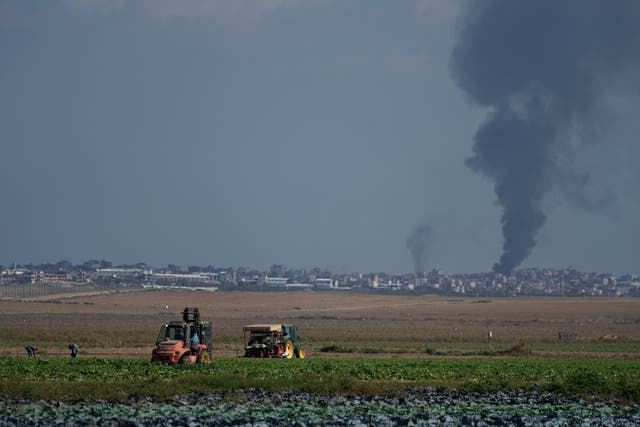The top United Nations humanitarian official has accused Israel of blocking the delivery of desperately needed aid to Gaza with the US ambassador demanding its government step up efforts to tackle the Palestinian territory’s ”intolerable and catastrophic humanitarian crisis.”
Acting humanitarian chief Joyce Msuya and US ambassador Linda Thomas-Greenfield stepped up the pressure on Israel at an emergency meeting of the UN Security Council on the escalating humanitarian emergency, especially in northern Gaza.
The council meeting, called by Algeria, the Arab representative on the council, followed a US warning to Israel to boost aid efforts dramatically or risk losing funding for weapons from its main supplier.
The Biden administration gave Israel 30 days to take a number of actions, including sending 350 trucks with food and other aid into Gaza every day.
Israel’s UN ambassador Danny Danon insisted his country’s humanitarian efforts remain “as comprehensive as ever” and criticised the council for focusing on the humanitarian situation in Gaza while Israeli civilians “are being targeted daily by those who seek our destruction”.
He said Israel has delivered more than one million tons of aid, including 700,000 tons of food, to Gaza since it launched its military operation after Hamas’ surprise attack in southern Israel on October 7 2023.
Mr Danon accused the international community of missing the real issue which he said was Hamas’ hijacking of aid shipments while fellow Palestinians suffer.
“This makes it incredibly difficult to ensure that the aid reaches its intended recipients,” he said, adding that Israel remains committed to working with its partners to deliver aid “even under these dangerous and morally reprehensible conditions”.
Ms Msuya, the top UN aid official, told the council tthere is barely any food left in northern Gaza where an Israeli offensive is under way. No food entered the north from October 2 to 15 “when a trickle was allowed in,” she said, and “most bakeries will be forced to shut down again in the next several days without additional fuel.”
Throughout Gaza, she said, less than one-third of the 286 humanitarian missions coordinated with Israeli authorities in the first two weeks of October “were facilitated without major incidents or delays”.
The level of suffering in Gaza worsens every day, she said, as Israeli bombs continue to fall, fierce fighting continues and “supplies essential for people’s survival and humanitarian assistance are blocked at every turn”.

Riyad Mansour, the Palestinian UN ambassador, accused Israel of besieging, bombing and starving 400,000 Palestinians in northern Gaza as part of its all-out war against the Palestinian people.
“These are crimes,” he said. “This is genocide. They must be stopped – and they must be stopped now.”
Ms Thomas-Greenfield pointed to new Israeli commitments since the US warning and two dozen trucks entering northern Gaza for the first time in several weeks.
But she said Israel’s progress since last week is “insufficient” and stressed it must follow through on its commitments, including opening more border crossings and routes and taking steps “to help secure delivery routes against armed gangs involved in violent looting.”
“A ‘policy of starvation’ in northern Gaza would be horrific and unacceptable and would have implications under international law and US law,” the US ambassador warned. “The government of Israel has said this is not their policy, that food and other essential supplies will not be cut off, and we will be watching to see that Israel’s actions on the ground match this commitment.”
At the council meeting, there were repeated calls by members for action by the UN’s most powerful body to end the more than year-long war in Gaza.
Guyana’s UN Ambassador Carolyn Rodrigues Birkett lamented that 47 Security Council meetings and four legally binding resolutions in the past year, including demands for a ceasefire, “have not had the expected results, and the situation in Gaza continues to worsen with each passing day.”
“We must not allow the shredding of the moral and legal thread that holds our organisation together,” she said. “The most fundamental question then that this council faces is, what will we do to stop this tide?”
Ms Thomas-Greenfield urged all council members to support the UN as it works with Israel to step up aid deliveries. She said the US focus in the coming months will be “getting humanitarian aid in, getting hostages out, and ending the conflict”.
Meanwhile, the Israeli military said it had killed a local Hezbollah commander in a southern Lebanese town near the border.
The military said on Thursday that an airstrike on Bint Jbeil killed Hussein Awada, who it said was in charge of firing projectiles into Israel from areas near the town.
Israeli strikes have killed Hezbollah’s leader, Hassan Nasrallah, and most of his senior commanders in recent weeks.
Elsewhere, Syria’s military said an Israeli strike early on Thursday in the coastal city of Latakia, wounded two civilians and damaged a military post.




Comments: Our rules
We want our comments to be a lively and valuable part of our community - a place where readers can debate and engage with the most important local issues. The ability to comment on our stories is a privilege, not a right, however, and that privilege may be withdrawn if it is abused or misused.
Please report any comments that break our rules.
Read the rules hereLast Updated:
Report this comment Cancel